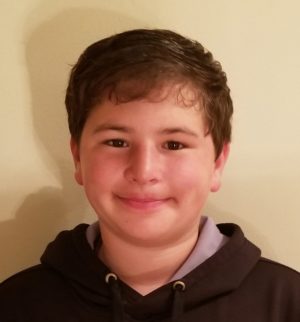Youth Perspective: Here’s Why We Need to Save Journalism
Plus, Busting the Myth that Kids Don’t Care About the News
By Maddie Stone
April 13, Mt. Kisco, NY — My name is Maddie Stone, and I’m 13 years old. I’ve found some people form an assumption about kids that just isn’t true. They automatically infer kids don’t follow the news. Why? Because we’re an inch or two shorter? Because we haven’t yet studied trigonometry? I intend to shoot down this myth and explain the importance of following the news.

It seems the day people turn 18, they immediately begin to believe anyone younger is completely clueless about what’s happening in the world. Don’t they recall the previous day, when they knew as much?
While kids almost always understand more about what’s going on than adults realize, including the importance of local news, I have a slight advantage. My dad (people other than my sister and I call him Adam Stone) is publisher of The Examiner, our local weekly print and online community newspaper. Having a publisher as a dad, I grew up learning all kinds of lessons about the press and why it’s important. But don’t let that make you think I’m one of the rare few. Just listen to what my friend Max Rubinstein has to say:

“The idea of children being dismissive to the media is simply preposterous and is most likely a result of modern stereotyping,” Max said.
Max, like me, is a 13-year-old seventh grader at Fox Lane Middle School in Bedford and we often talk about current events. How are we informed? By reading, watching, and listening to quality journalism.
“I watch the news to gain insight into the international community and to learn about the status and structure of American politics,” Max added.
My friends, my teammates and I are keenly aware of the world around us; we’re not naive and ignorant. For the most part, we listen to our local news broadcasts, read our community newspapers, just as much as the average person. Keeping up with the times is important for people of all ages.
The press informs the people of important issues and events, from a local carnival to a global pandemic. Especially in times like the present, when faced with a crisis, it is even more urgent to stay updated on the data, or, in this case, the spreading and containing of the coronavirus. Even on a local level, when a mayor, town supervisor, or school board reveals a proposal, it is critical for the public to be alerted of the news.
In addition to keeping citizens informed, journalists provide coverage that allows people to remain up-to-date, and, therefore, safe and free from harm. Once again circling back to the coronavirus, newscasters and print journalists are frequently encouraging self-quarantine, hand washing, and remaining six feet apart if you must leave home. This does not just apply to the epidemic that has swept the nation. Most news outlets will showcase topics such as poverty, equality, environmental contamination, and, locally, clean drinking water, jobs, and crime. News supplies citizens with knowledge they can use to make decisions about their safety and general well-being.
“An informed society is an educated society, and you cannot have a well-functioning democracy unless a country’s citizens are informed,” observed Martin Wilbur, editor-in-chief of The Examiner. His insight led me to my next point: It’s essential for every country, every state, every county, every city, to remain educated. If the general public is educated, the people are empowered.
However, people can only be educated if the news sources they’re using are reliable. It’s like dominos; if you’re educated, you’re informed. If you follow reliable news sources, you’re educated. But even if you read the news, and you read a biased, untrustworthy source, the whole thing comes crashing down. That’s what makes becoming a knowledgeable citizen so challenging.
Furthermore, journalists keep the government in check. They expose fraud and unethical behavior in our leaders. An invisible fourth estate that monitors authority figures. This includes local government. Former Speaker of the House of Representatives, Tip O’Neill, was perhaps most famous for saying, “all politics is local.” This certainly applies here. Most controversies that arise in local government and are exposed by local reporters can’t be compared to controversies as grand in scope as, say, the Watergate affair. But those stories are often the ones most impactful to people’s everyday lives.
Also, keeping the government in check does not just involve reporting on controversy and scandal. Keeping the government in check means keeping elected leaders honest, so when a government official says or does anything, and a journalist reports on it, that’s a perfectly valid example of keeping the government in check.
Speaking of keeping an eye on local government, whether my dad is talking about his work day at the dinner table or running away from the dinner table to write about a breaking political story, the news is definitely a large part of our life at home. I’m aware of what’s happening locally, so I know journalists are always attending school board meetings, writing about statements from politicians, and scrambling to meet deadlines. Either way, they are constantly busy with elected officials. But never too busy to watch their awesome, fleet-footed, line-drive hitting, 13-year-old daughter’s softball games, of course.
While I usually like to just make fun of my dad, I figured I would quickly take this unique opportunity to suggest you read his column on how The Examiner has been trying to survive these turbulent times: https://www.theexaminernews.com/want-to-save-journalism-start-local-support-the-examiner/

And as much as I love Inside Press, The Examiner, and local news in general, let’s take a moment to step away from our neck of the woods. Journalism also allows us to understand places beyond our backyard. Without journalists to report on places far away, how would we know what’s happening in India? What about Canada? What about upstate New York? What about anywhere outside our little bubble?
As important as it is to study journalism, it is equally as important to support it. The adult consumers of today were once kids and the kids of today are the adults of the future. In the words of Thomas Jefferson, “Our liberty depends on the freedom of the press, and that cannot be limited without being lost.”
In order to preserve this liberty, the youth of today must value and support well-sourced, quality journalism. We must be thankful for the news outlets we have but also think back on how much we’ve lost. Just a few years ago, the country enjoyed so many more journalists, especially print journalists. In case you didn’t know, over the past 15 years, one in five newspapers have gone out of business, and the number of journalists employed at newspapers have been cut in half. These numbers are only getting worse. My dad taught me most of what I know about journalism, but the following I can infer on my own: save the press now while there’s still time.
Maddie Stone is a 13-year-old, seventh grader at Fox Lane Middle School in Bedford. This article is also appearing on The Inside Press website — https://www.theinsidepress.com — as well as next week’s four print editions of Examiner Media’s community newspapers, as well as here at TheExaminerNews.com. Link to Examiner – COVID19 Local News Fund: https://givebutter.com/theexaminernews

Examiner Media – Keeping you informed with professionally-reported local news, features, and sports coverage.
